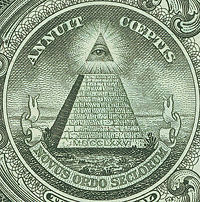In the US, the two largest confessional Lutheran synods are the Lutheran Church-Missouri Synod (LCMS) and the Wisconsin Evangelical Lutheran Synod (WELS). The next two largest synods are the AALC, which is in full fellowship with the LCMS and the ELS, which is in fellowship with WELS. Therefore, since the vast majority of Confessional Lutherans fall into one of these two groups, it is worth evaluating the differences. From my studies, there appear to be a few main theological differences between the LCMS and the WELS.
The first, and main difference, is the understanding of fellowship. The WELS
holds to what is called the "unit concept" of fellowship, which
places virtually all joint expressions of the Christian faith on the same
level. In an official statement made in 1960 the WELS states, "Church fellowship should
therefore be treated as a unit concept, covering every joint expression,
manifestation, and demonstration of a common faith" (Doctrinal Statements
of the Wisconsin Evangelical Lutheran Synod, 1970, pp. 51-52). The LCMS,
however, has historically not understood or practiced church fellowship in this
way, but has made a distinction between altar and pulpit
fellowship (for which full doctrinal agreement is required) and other manifestations
of Christian fellowship, such as prayer fellowship (which do not necessarily
require full doctrinal agreement). Disagreements on this issue led the Wisconsin to break
fellowship with the LCMS in 1961.
In 2002, in order to defend the actions of one District President, the LCMS adopted the view that public serial prayer is not an act of fellowship because prayer isn’t worship. However, Martin Luther claims that prayer is an act of worship as follows:
"But the Scripture teaches not the invocation of saints, or to ask help of saints, since it sets before us the one Christ as the Mediator, Propitiation, High Priest, and Intercessor. He is to be PRAYED to, and has promised that He will hear our PRAYER; and this WORSHIP He approves above all, to wit, that in all afflictions He be called upon, 1 John 2,1: 'If any man sin, we have an Advocate with the Father, etc.'" (Augsburg Confession Article XXI.3 Concordia Triglotta page 57
"The First Commandment demands faith, that you believe that God is a Helper in due time, as Ps. 9:9 declares. The Second demands confession and prayer, that we call upon the name of God in danger and give thanks to God. The Third, that we teach the truth and defend and preserve sound doctrine. These are the true and only forms of worship of God, which God demands . . ." LW1:328-329
"Because no law had yet been given about worship in a certain place, they were free to sacrifice everywhere, just as we today are free to pray everywhere." LW2:192
". . . the real kernel of worship, which is to give thanks, pray, hope, and confess even under the cross and in disaster." LW6:237
Luther says: "In our days they [the papists] let obedience lie and lead us so deeply into works, that we have completely drifted from obedience, and we gape at works and despise our own mission and calling. Hence there is no doubt it is Satan's own doings that divine worship is confined only to churches, altars, masses, singing, reading, offerings and the like, as if all other works were vain or of no use whatever. How could Satan mislead us more completely from the right way than when he confines God's worship within such narrow limits, only to the church and whatever is done it?" In "Sermons of Martin Luther" [Lenker Edition], Vol. 1, page 245.
The second is the doctrine of the ministry. With respect to the doctrine of the ministry, since the
days of C. F. W. Walther the LCMS has held that the office of the public
ministry (the pastoral office) according to Scripture is the one divinely established
office in the church, while the church possesses the freedom to create other
offices, by human institution, from time to time to assist in the carrying out
of the functions of the pastoral ministry. The WELS' Theses on Church and Ministry, expressly deny that the pastoral ministry is specifically instituted
by the Lord in contrast to other forms of public ministry, such as teaching Bible studies.
The third is the role of women in the church. While both the LCMS and the WELS strongly oppose the ordination of women
to the pastoral office on Scriptural grounds, most of the LCMS officially has concluded that the
Scriptures do not forbid woman suffrage in the church (although some disagree). The WELS opposes woman suffrage in the church as
contrary to Scripture.
The fourth is that on the "Church" the LCMS focuses on the local congregation as Church,
pointing out that this is where the marks of the Church, the preaching of the
Gospel and administration of the Sacrament, are found. In the LCMS view, things
like Districts or Synod are not, strictly speaking, “Church”. The WELS, on the other hand
notes that when the District or Synod gathers, it is still a gathering amongst
Christians, often where the preaching of the Gospel and the Administration of
the Sacraments are present. To its credit, the WELS is a bit more consistent on this than
the LCMS, which gets around the whole District and Synod not being church and
yet having a church service at such gatherings by having a local congregation
“adopt” such a gathering (or school/university chapel).













